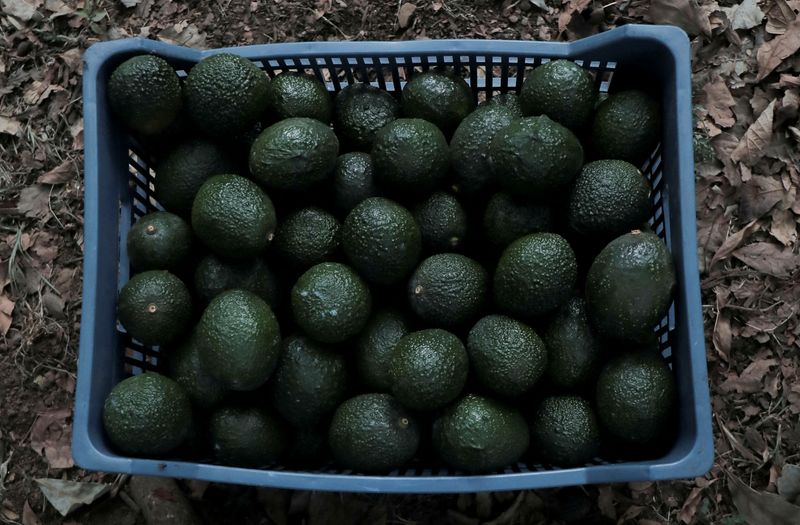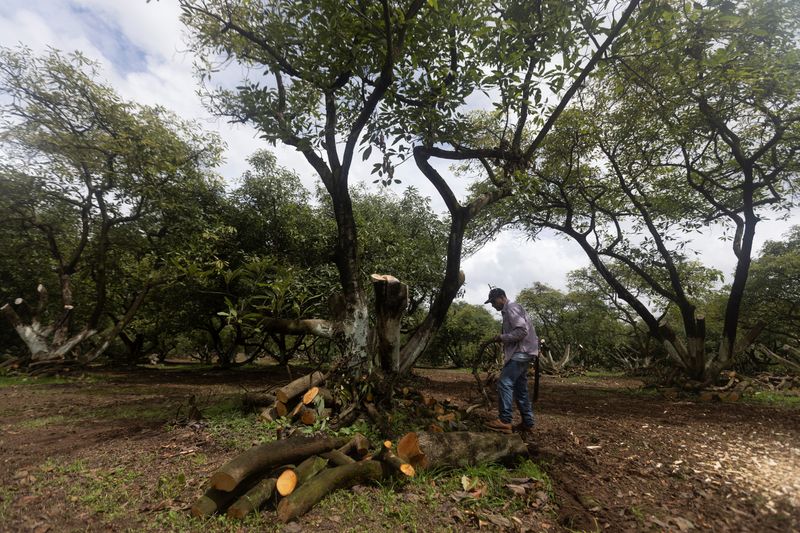Commodities
Avocado goldrush links US companies with Mexico’s deforestation disaster

By Cassandra Garrison
URUAPAN, Mexico (Reuters) – On a sweltering July afternoon, two large yellow bulldozers dug into the brown soil at the bottom of a lush avocado orchard near the small town of Madero, located in central Mexico’s Michoacan state.
Drone footage recorded by Reuters captured the earth movers hollowing the ground, in what Mexican environmental group Guardian Forestal – which collaborates with the Michoacan state government – and an activist who reviewed the video described as an attempt to construct a water reservoir.
Mexican law requires an environmental impact study and permit to store and use water for resource-intensive avocado farming. Data from the national water authority Conagua showed only 42 reservoirs and wells in Madero were registered with permits. However, two activists interviewed by Reuters said there were hundreds of similar water pools in the area.
With Michoacan battling a drought, avocado producers often resort to taking water from lakes or communal basins, draining them to worrying lows, according to three local and state officials.
Illegal practices in Mexico’s avocado heartland, which is expanding rapidly to feed growing demand in the United States, come at the expense of nearby forests, according to Michoacan government officials.
The environmental damage has prompted U.S. nonprofit the Organic Consumers Association to file lawsuits against unlisted West Pak Avocado Inc and another major avocado importer Fresh Del Monte Produce Inc for labeling Mexican avocados as “sustainable” or “responsibly sourced.”
“Contrary to West Pak’s representations, its avocados are neither responsibly sourced nor environmentally sustainable,” the Organic Consumers Association, a Minnesota-based lobby group that has sued various food and agriculture companies over marketing claims, said in one of the lawsuits.
West Pak declined to comment and Fresh Del Monte did not respond to questions for this story.
The U.S. lawsuits filed in DC Superior Court Monday shine a spotlight on the supply chains of some U.S. companies operating in the Mexican avocado industry.
While lucrative for the growers, the industry is under increasing pressure from organized crime groups and facing accusations of rising environmental damage.
Reuters visited two orchards in July that an analysis of satellite images by U.S. nonprofit Climate Rights International showed were illegally deforested in Madero after 2015.
Climate Rights International identified these two orchards as having sold avocados to West Pak as recently as December and January, according to Mexican government shipping records, also reviewed by Reuters.
During a July visit, the news agency’s journalists observed the farm machinery digging a water reservoir on one of them.
The lawsuits, filed by Irvington, N.Y.-based law firm Richman Law and Policy on behalf of the Organic Consumers Association, demand an injunction be put in place that would require West Pak and Fresh Del Monte to remove their marketing claims of a sustainable supply chain, citing water scarcity, climate change and a decline in the migration of endangered Monarch butterflies that flock yearly to Michoacan.
The Organic Consumers Association is also asking the court to declare that the two avocado importers are violating the District of Columbia’s consumer protection law, and to bar them from continuing such conduct.
AVOCADO DEMAND SKYROCKETS
Avocado exports to the United States have soared 48% since 2019, according to U.S. trade data. The U.S. market accounts for about 80% of Mexico’s total avocado exports, data by the U.S. Department of Agriculture shows, a trade worth $3 billion last year.
In February, U.S. Ambassador to Mexico Ken Salazar said avocados sourced from illegal orchards should be blocked from the U.S. market. There has been no government action from either Washington or Mexico to do so.
The voracious U.S. demand for the staple ingredient of guacamole divides communities in Mexico, where it is both a driver of economic growth and the catalyst for an environmental and social crisis.
Dubbed “green gold” among Mexicans, the avocado trade has attracted crime groups that extort payments from producers and have acted as muscle for others by displacing people and deforesting the once-verdant countryside, according to 10 locals interviewed by Reuters in Michoacan.
Climate Rights International, whose findings are cited in the Organic Consumers Association’s lawsuits, said it has documented more than 30 threats or acts of intimidation associated with the expanded avocado trade, including four abductions and five fatal shootings.
One Madero farmer, who asked to remain anonymous due to concerns for his safety, said he was was kidnapped after he protested deforestation. “If they only knew … behind every avocado that people in the United States eat, there is a bloodstain, a dead person, a missing person,” he said.
Reuters could not independently verify the accounts from the local residents or Climate Rights International’s findings.
Up to 70,000 acres in Michoacan and neighboring Jalisco state have been deforested for avocado farming in the last decade, the data from Guardian Forestal and Climate Rights International show.
Residents told Reuters some local people fight back by destroying the illegal water pumps installed by producers that drain communal reservoirs.
“They have even gone to destroy avocado orchards,” said Claudia Alejandra Sanchez, an activist for Michoacan’s Purepecha indigenous people.
Climate Rights International, which has tracked human rights violations linked to climate change including in Mexico’s avocado trade, told Reuters it contacted West Pak, Fresh Del Monte and other U.S. importers and supermarket chains including Whole Foods Market, Costco (NASDAQ:), Trader Joe’s and Target in April and November last year regarding their supply chains. Reuters reviewed copies of letters shared by Climate Rights International.
Yet the importers and U.S. retailers still sell avocados sourced from illegally deforested orchards in Michoacan, according to a new report by Climate Rights International and Guardian Forestal exclusively reviewed by Reuters.
The new data shows West Pak, Fresh Del Monte and other importers kept shipping from illegally deforested orchards even after being informed of the deforestation in their supply chain, according to Climate Rights International’s analysis of trade records.
The two importers’ avocados landed on the shelves of U.S. supermarkets, the Climate Rights International’s findings showed. Most of those companies have publicly pledged to adhere to sustainable supply chains in compliance with local laws.
Reuters requested comment from nine major U.S. supermarkets and food chains that sell Mexican avocados to ask how they ensured their supply chains were free of illegal deforestation and violent exploitation.
Only Amazon (NASDAQ:)’s Whole Foods Market responded, saying it was actively working with its suppliers to “prioritize Fair Trade certified and other responsibly sourced avocados.”
Daniel Wilkinson, Climate Rights International’s senior adviser, said: “If these companies are serious about their public commitment to sustainability, they could easily clean up their supply chains and greatly reduce the main incentive driving the deforestation and attacks on local communities.”
‘SET MOUNTAINS ON FIRE’
Mexico requires legal permission to convert forest to agricultural land and has not granted such authorizations in Michoacan for nearly three decades, Michoacan’s Secretary Of Environment Alejandro Mendez told Reuters.
“About eight or ten years ago it was pure wilderness here,” said Madero’s environmental director Savas Melchor Gomez, standing in front of the orchard’s trees. “They set the mountains on fire to clear them and continue expanding, and it goes on and on.”
To deal with endemic logging, Michoacan officials plan to establish an online platform that offers public information about illegally deforested orchards.
The platform, which officials said they want to launch this month, would certify avocados from orchards that do not deforest illegally.
Michoacan Governor Alfredo Ramirez said the platform should enhance transparency by allowing foreign governments and companies to see where avocados from illegally deforested areas are going.

“So far, no large supermarket has approached us over this issue… but we do not really see an interest in it, these companies taking any responsibility,” Ramirez said in an interview.
Activists, local officials and researchers who spoke to Reuters estimated the true number of illegal orchards in Michoacan was likely in the thousands and would not be properly identified by the platform, which only includes illegal deforestation after 2018.
Commodities
Oil prices rise; U.S. crude inventories plunge, Russia-Ukraine truce eyed
Commodities
India’s Reliance to stop buying Venezuelan oil over US tariffs, sources say
Commodities
Oil prices climb on Venezuela supply worries

 Forex4 years ago
Forex4 years agoForex Today: the dollar is gaining strength amid gloomy sentiment at the start of the Fed’s week

 Forex3 years ago
Forex3 years agoUnbiased review of Pocket Option broker

 Forex3 years ago
Forex3 years agoDollar to pound sterling exchange rate today: Pound plummeted to its lowest since 1985

 Forex3 years ago
Forex3 years agoHow is the Australian dollar doing today?

 Cryptocurrency3 years ago
Cryptocurrency3 years agoWhat happened in the crypto market – current events today

 World3 years ago
World3 years agoWhy are modern video games an art form?

 Commodities3 years ago
Commodities3 years agoCopper continues to fall in price on expectations of lower demand in China

 Economy3 years ago
Economy3 years agoCrude oil tankers double in price due to EU anti-Russian sanctions























